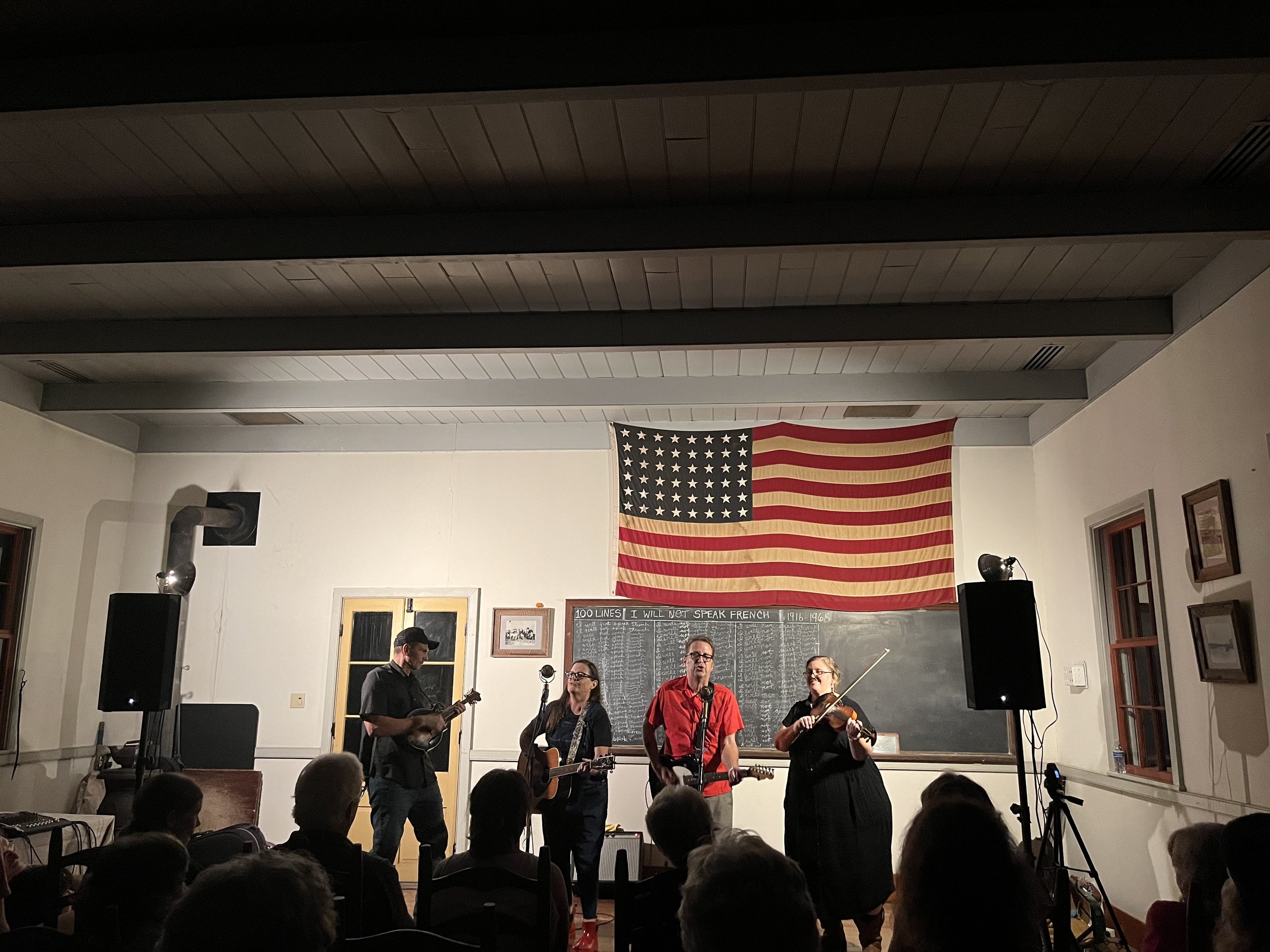Blackpot Festival and Cookoff 2023
Jean Bertrand of the Pine Leaf Boys and 99 Playboys prepares gumbo in black pots.
Photo by Anja Maijala
During the final weekend of October, I had the privilege to attend the 17 th annual Blackpot music Festival and Cookoff in Lafayette, Louisiana. Blackpot is an annual gathering focused on Cajun music, cuisine, and culture, but is something much bigger than that. What follows is my account of the two-day festival which contains information about some of the artists that I got to see perform and my overall experience. The bottom line to takeaway if you don’t care for details regarding artists’ names, my attempts at categorizing genres of music, and musical instruments, is this: If you enjoy live music, appreciate regional music, like dancing, and/or love Cajun food, I can strongly recommend attending Blackpot Festival and Cookoff.
The music represented at the festival encompassed a wide range of sounds spanning what I would describe as the larger umbrella of folk music. As an Alaskan who is not familiar with the cultural tradition of southern Louisiana, my knowledge of Cajun music and culture is quite minimal, but that didn’t seem to be a prerequisite at all to appreciate the exceedingly rich display of culture at Blackpot. With that being said, it should be noted that there are distinct terms for the different Francophone – or French speaking – cultures in Louisiana, including Cajun and Creole, and different people seem to have their own definitions for those terms. The word Cajun comes from French Canadian settlers who emigrated from Acadia – or Nova Scotia and New Brunswick – to Louisiana, with the term “Cajun” deriving from “Acadian.” Additionally, there are people who don’t identify with either term and prefer the all-encompassing term Louisiana French.
The festival took place at Vermillionville, a historic village site near Lafayette, with things kicking off Friday evening. Three different stages each with music being performed made it essentially impossible to see all of the amazing artists who came to Blackpot, but it also provided for a rich and diverse experience for me as an audience member. My traveling companions – my partner Anja and our friend Jordi – and I started our evening off by heading to the old schoolhouse to see Deano and Jo, a duo who were joined by former Fairbanks residents Jason and Beth who played mandolin and fiddle respectively. They played old time, bluegrass, and country tunes and sang with beautiful harmonies that easily filled the one-room schoolhouse. I particularly enjoyed their renditions of the Stanley Brothers’ Stone Walls and Steel Bars and the George Jones tune Milwaukee, Here I Come. We briefly stopped by the main stage to see Jourdan Thibodeaux et Les Rôdailleurs play Cajun – or Louisiana French – music.
As an outsider, I would describe their sound as energetic rock-esque music led by Jourdan Thibodeaux’s fiddle playing and singing in French. It turns out that he is very active in a growing movement to revitalize Louisiana French language and culture, and has a substantial social media presence, which he uses for that cause. It was cool to see someone from a younger generation singing in French, as I was unaware of this movement and previously thought of French speaking in Louisiana as something that was mainly confined to the past. Even if I couldn’t understand the words being sung, I’m glad to find out I was very mistaken. After our stop at the main stage, we walked to the chapel to see a Canadian group called Les Hay Babies, but not all of their members were able to make it, so that time slot was filled by Miss Tess and her band playing a blend of country and rock-and-roll.
By the end of their performance it was 9:30 and the schoolhouse and chapel stages were no longer active, so we wandered back to the main stage where a band called Pussy Gillette was performing. This band doesn’t identify their sound with a particular genre, but their stage presence, attitude, lyrics, and sound all struck me as closely resembling that of punk. A fellow Alaskan who has attended quite a few Blackpots now told us that Pussy Gillette was the festival “branching out,” and while theirs may not have exactly been the type of music I was looking for at the festival, it certainly contributed to the broad representation of music there. Friday night finished off with the Pine Leaf Boys, a Cajun band that seemed to be a bit of a festival/local favorite. One thing I appreciate about Cajun music is that it feels as though it is meant to be danced to, and while I certainly have a long ways to go as a dancer, I got some good practice dancing the waltz and two- step with a partner. A highlight of their set was when they brought Drake Leblanc, another French language revivalist and filmmaker on stage and he crowd surfed while playing the trumpet.
This photo is Deano and Jo performing with friends in the packed schoolhouse at Vermillionville.
Photo by Anja Maijala
Saturday kicked off with a square dance at the main stage backed by old time string music featuring Osage, Creek, and Cherokee fiddler Nokosee Fields, who was recently featured in the Martin Scorsese film, Killers of the Flower Moon. After having experienced it firsthand, I would argue that swinging, promenading, and do-si-doing your partner at the command of a small gray haired lady is a pretty great way to start a Saturday at a folk music festival. From my limited experience, square dancing is a welcoming, forgiving, and fairly straightforward form of dancing. Following the dance, we made our way over to the schoolhouse where we watched Becky Hill display her very impressive percussive dance skills accompanied by the banjo playing of Ben Nelson.
For those unfamiliar with percussive dance, it is a broad term that includes tap-dancing, clogging, and flatfooting and serves to add percussion and rhythm to music, usually in place of drums or other percussion, but also adds a performance element, that in the case of Becky Hill, is quite a spectacle to behold. We made our way over to the chapel, where we watched the full performance by The Faux Paws, a quartet with upright bass, acoustic guitar, tenor saxophone, and fiddle. The sax and fiddle players traded off with banjo and mandolin, respectively, making for a really fun and engaging listening experience with instances where the fiddle/mandolin player was performing percussive dance in his chair while simultaneously playing an instrument and singing. Their sound struck me as very unique and difficult to label with a single genre, as I’m not sure that I’ve heard tenor sax, mandolin, and upright bass come together in song before. Whatever they call their sound, it’s good. Another personal highlight from the afternoon was the performance by the duo Lost Patterns in the old schoolhouse. This duo was made up of mandolin player and guitarist Silas Lowe, and former Fairbanksan and fiddler/guitarist Beth Chrisman, whose folk/Americana tunes I quite enjoyed.
Midafternoon, we wandered over to where the cook-off was taking place, with well over a dozen different tents set up to showcase Cajun cuisine. The vast majority of these dishes were cooked – as the name of the festival suggests – in a massive black cast iron pot. The dishes were served to a panel of judges as well as to long lines of festival attendees – including my group – who waited in hopes of getting their bowls filled before the food was all consumed. In several instances, we were too late and missed out on several tasty-sounding dishes. However, we still managed to get quite full, sampling several different variations of jambalaya and gumbo, some of which were reported to contain less common meats like squirrel and wild boar. All the while, the nearby cookoff stage was in full musical swing, with the sound of Cajun tunes drifting over to accompany our Cajun culinary experience.
Later in the evening, after our stomachs had settled some, we ventured back to the tent to change into our Halloween costumes that we had purchased at a costume shop in Lafayette specifically for this evening. We hurried back to Vermillionville, where we were able to catch the tail end of the performance by the Broussard Sisters at the chapel stage. The sisters perform a style of music called juré, which is a longstanding Creole musical tradition dating back to the time of slavery and consists of a cappella call-and response singing. The performance struck me as coming from a deeply rich spiritual tradition as it filled up the old chapel and seemed to really move everyone in attendance, including myself. We made our way back to the main stage, by which time the other stages were no longer hosting performances, so festival attendees were concentrated at the main stage, with a mass of costumed people all somehow managing to dance with minimal space around them. The group on stage at this point was Los Guiros, a self-described psychedelic Cumbia band that incorporates influences of folk, electronic dance, Latin, and world music into their songs.
They utilize an array of instruments including the ever-present accordion, acoustic and electric guitars, and a rhythm section that, in my opinion, steals the show and includes timbales, congas, a drum set, and a sousaphone. This is topped off by the band’s namesake, the guiro, which in their case is an open-ended metal cylinder with notches that is played by rubbing a stick or metal-tined brush along it. I found their performance to be extremely fun to dance to and I greatly enjoyed their fusion of sounds. After a costume contest in which we had a lackluster reception, the evening was capped off by the Revelers, somewhat of a Louisiana supergroup, composed of members of other preeminent Cajun bands, and unhindered by genre constraints. Their songs include Cajun, Zydeco, Americana, and Swamp Pop tunes and their performance featured a number of onstage guests, many of whom were familiar faces by this point. More excellent dancing music ensued until around midnight, when the festival came to a close. We meandered back to our tent under a full Cajun moon, our heads full of music.
In summary, Blackpot blew my mind with the breadth and depth of music on display, as well as the immense amount of talented musicians present, and the awesome community of folks who love the music. I feel as though I have barely scratched the surface of Cajun music and the incredibly deep well of Louisiana musical tradition, and the Blackpot experience left me hungry for more – music and jambalaya.
By Trevor Schoening


